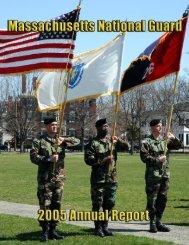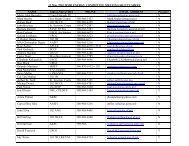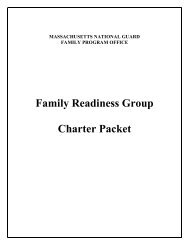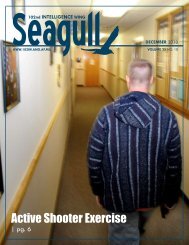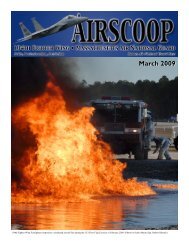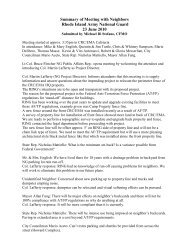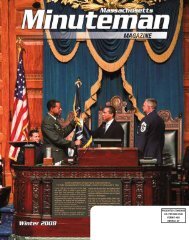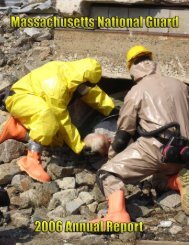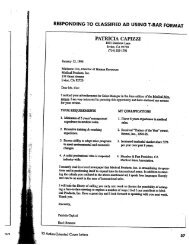Summer 2010 - STATES - The National Guard
Summer 2010 - STATES - The National Guard
Summer 2010 - STATES - The National Guard
You also want an ePaper? Increase the reach of your titles
YUMPU automatically turns print PDFs into web optimized ePapers that Google loves.
Story and photos by Air Force Capt. Evan C. Lagasse<br />
102nd Intelligence Wing Public Affairs<br />
OTIS AIR NATIONAL GUARD BASE, Mass. – Five members of the Royal<br />
Jordanian air force visited Otis Air <strong>National</strong> <strong>Guard</strong> Base for three weeks,<br />
Jan. 25 to Feb. 12, to train with the Precision Measurement Equipment<br />
Laboratory team here.<br />
<strong>The</strong> main focus of the training was on measuring and calibrating various<br />
bore sight fixtures for the F-16 Fighting Falcon.<br />
“We’re getting hands-on training on the calibration of bore sight fixtures<br />
which are done for the alignment of the F-16. We had difficulty understanding<br />
the complicated measurement procedures, so we came over to<br />
Otis Air <strong>National</strong> <strong>Guard</strong> Base to get training, and then we’ll be able to do<br />
these complicated measurements by ourselves,” said Royal Jordanian air<br />
force Lt. Col. Nalby Lbzo, RJAF calibration laboratories officer in charge.<br />
<strong>The</strong> Otis PMEL facility supports various airframes, more than 15,000<br />
items, and provides calibration, repairs, research and development to the<br />
field. It is the only Type II C lab in the Air <strong>National</strong> <strong>Guard</strong>, which means<br />
the lab has a room maintained at a constant 68 degrees Fahrenheit, plus<br />
or minus one degree, but the facility wasn’t the only reason they were<br />
selected to train the Royal Jordanian air force.<br />
“We were asked by the Air Force to help train the Jordanians on the F-16<br />
bore sights not only because we are the only Type II C lab in the Air<br />
<strong>National</strong> <strong>Guard</strong>, but because we have the expertise,” said Todd Morey,<br />
PMEL lab supervisor.<br />
Much of that expertise comes in the form of PMEL Technician Timothy<br />
Yousey. He used to be an instructor at the U.S. Air Force’s PMEL school<br />
house located at Keesler AFB, Miss., and was assigned to teaching the<br />
RJAF members how to calibrate the bore sight fixtures.<br />
“When you’re calibrating the bore sights, a lot of it is about feel, so it<br />
helps to have someone with more than 20 years of experience [Yousey]<br />
Timothy Yousey, top right, Precision Measurement Equipment Laboratory<br />
technician, watches Royal Jordanian air force Lt. Col. Nalby Lbzo calibrate an F-16<br />
Fighting Falcon bore sight, Feb. 9, <strong>2010</strong>, using techniques learned from Yousey<br />
during the Royal Jordanian air force members’ three-week training visit to Otis Air<br />
<strong>National</strong> <strong>Guard</strong> Base, Mass.<br />
Top photo: Royal Jordanian air force Lt. Col. Nalby Lbzo calibrates an F-16 Fighting<br />
Falcon bore sight at Otis Air <strong>National</strong> <strong>Guard</strong> Base’s Precision Measurement<br />
Equipment Laboratory Feb. 9, <strong>2010</strong>.<br />
showing you how to approach the measurement rather than just pushing<br />
your way to the measurement,” said Morey.<br />
<strong>The</strong> main goal of the training was to assist the RJAF in becoming self<br />
sufficient with bore sight fixture calibration so they can accomplish the<br />
work “in house” and eliminate the need to send parts to the United States.<br />
“This will tremendously affect our air force because right now we don’t<br />
have the capability of training or the capability to calibrate these fixtures<br />
by ourselves. Now we should be able to do these measurements by<br />
ourselves in Jordan,” said Lbzo.<br />
As with most military endeavors, detailed coordination, planning and<br />
support from senior leadership were essential to make this training<br />
partnership a reality, a fact not lost on the participants.<br />
“<strong>The</strong> support of our leadership and proper funding is imperative to make<br />
these types of training partnerships a reality. We would like<br />
the spirit of cooperation to continue between the two countries,” said Rick<br />
Lawrence, PMEL superintendent. ✯<br />
<strong>The</strong> Nation’s First 9




